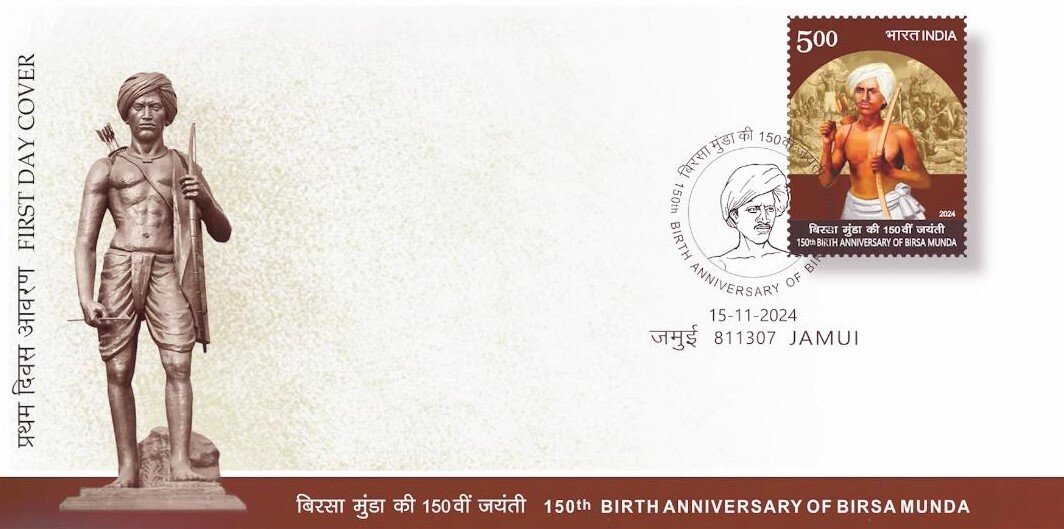150th Birth Anniversary of Birsa Munda

Technical Data
| Date of Issue | November 15, 2024 |
|---|---|
| Denomination | Rs. 5 |
| Quantity | 202,800 |
| Perforation | 13½ |
| Printer | Security Printing Press, Hyderabad |
| Printing Process | Wet Offset |
| Watermark | No Watermark |
| Colors | Multicolor |
| Credit (Designed By) | Sh. Sankha Samanta |
| Catalog Codes |
Stanley Gibbons IN 3921 Colnect codes IN 2024.11.15-01 |
| Themes | Anniversaries and Jubilees | Famous people | Independency Activists | Men |
Early Life and Tribal Roots
Birsa Munda was born on 15 November 1875 in Ulihatu, Bihar (now in Jharkhand), into the Munda tribe, an indigenous community of the Chotanagpur Plateau. Growing up in a family of agriculturalists, Birsa was deeply connected to the traditions, culture, and identity of his people, which shaped his lifelong commitment to the rights of tribal communities.
Awakening Against Colonial Oppression
During his formative years, Birsa witnessed the exploitation of tribal lands by landlords and moneylenders under British colonial rule. The erosion of tribal rights, combined with forced conversions by missionaries, ignited his resolve to defend his community. His growing spiritual inclination led to the formation of the Birsait sect, which emphasized worship of a single God and revival of indigenous traditions, inspiring unity among the tribal people.
Birsa as Prophet and Leader
By 1894, Birsa had proclaimed himself a prophet with a divine mission to liberate his people. His message encouraged tribals to abandon imposed practices, return to their cultural roots, and resist colonial dominance. His charisma and powerful oratory drew widespread support, transforming him into a symbol of hope and resistance.
The Ulgulan – The Great Rebellion
Birsa’s most significant legacy was leading the Ulgulan (Great Rebellion) from 1899 to 1900. This movement sought to establish Munda Raj, expel British officials and landlords, and reclaim ancestral lands for the tribal people. It was not just a rebellion but a socio-political movement centered on land rights, self-governance, and cultural revival. Despite brutal repression by colonial forces, Birsa’s call to arms united thousands in a struggle for justice.
Martyrdom and Enduring Legacy
Captured in February 1900, Birsa was imprisoned and tragically died in custody on 9 June 1900, at just 25 years of age. His martyrdom transformed him into a folk hero and eternal symbol of resistance against oppression. Statues, memorials, and cultural celebrations across India keep his spirit alive.
Birsa Munda Jayanti and Modern Relevance
Birsa’s birth anniversary, 15 November, is celebrated as Birsa Munda Jayanti, a public holiday in Jharkhand and other states. His vision for social justice, land rights, and tribal empowerment continues to inspire activists, environmentalists, and indigenous movements in contemporary India.
Philatelic Tribute
To honor his 150th Birth Anniversary, the Department of Posts is proud to issue a Commemorative Postage Stamp on Birsa Munda. This stamp celebrates his role as a tribal leader, freedom fighter, and reformer, highlighting his vision for equality, justice, and resilience. It stands as a tribute to his unwavering spirit and an inspiration for future generations to uphold the ideals of unity, dignity, and empowerment.
First Day Cover

